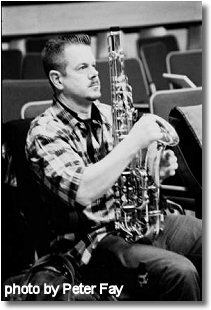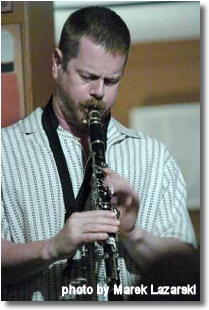|
Interview with Ken Vandermark
by Stefano Ferrian
|
 |

You're one of the most talented, prolific and versatile
musician of these days. I know that you're based in Chicago since 1989 and seems
to me that it was the first fundamental step to begin your new life as a musician.
What Chicago represent for you?
Actually, my musical foundation was built during the time
I lived in the Boston area, as a teenager and after I returned from University in
Montreal, from 1986-1989.
In those periods the scene in Boston, Cambridge, and Somerville was extraordinary.
Many great musicians were living and performing in town (Joe Morris, David
Bryant, the members of the Fringe, for example), and an large number
of artists would visit from out of town (incredible shows with Don Cherry
and Edward Blackwell,
Archie Shepp,
The Art Ensemble, etc.). The discipline and intensity I experienced in those
years completely shaped my perspective towards performance and the music.
The first years I spent in Chicago were very difficult. After playing with musicians
in Boston following college, I could not find like-minded musicians in Chicago who
wanted to collaborate with me until the start of 1992,
when I began to play with Kent Kessler and Michael Zerang in the Vandermark Quartet.
From that point onward things began to develop in Chicago for me. For many years
it has been the best possible location for me to live in the world. I am able to
develop ideas and ensembles at home, performing on a regular basis (usually at least
once a week when I'm back from tour), and I am also able to collaborate with musicians
from outside that city.
Because musicians there have learned the importance of self-determination (both
from the example of the AACM, and the DIY methods of punk rock), the present performance
situation in Chicago is largely based on weekly series that are primarily organized
by musicians. In a sense, "We need the gigs so we need to organize them." Because
of the variety a number of musician directed music opportunities, alongside the
work of Michael Orlove of the Chicago Cultural Center and other open minded presenters,
there is a constant influx of visiting artists that help build and inspire new ideas
for the musicians living in Chicago and for the listeners in that city. Other than
Berlin, I can't think of a better situation that exists for the music and the musicians.
I would include New York/Brooklyn, but the expense of living in that area is almost
crippling for the musicians I know that live there.
Now I ask you to come back in the eighties and focus your
mind on the exact moment that you realize you wanted to be a musician. What's the
main reason and what made you believe that you really can do that in your life?
During my last year in University, where I studied Film, I realize that I wanted
to devote my life to Jazz and Improvised Music. I was spending more and more time
practicing and rehearsing with my band, and less and less time doing my academic
course work. When I graduated I went back to Boston to pursue this idea, and I new
that I didn't want to work as a "professional musician," playing weddings and parties
to earn a living. Instead, I chose to work at a convenience store and a hardware
store, so that when I picked up the horn- whether it was to practice, rehearse,
or perform- I was dealing with "my" music. For me, this was the right choice. After
nearly a decade of working 40+ hours a week at a day job, I was finally able to
try and work part time and teach privately, then quit everything but the work towards
musical goals. In a large part I owe this possibility to my wife, Ellen, who has
been nothing but supportive in the time that we have been together.
 What's
your major inspiration when you're composing new music or you're improvising on
a stage with other musicians? What's
your major inspiration when you're composing new music or you're improvising on
a stage with other musicians?
There are many things that motivate me, that go into the process of composing
or improvising. Fundamentally, it's the music itself that drives me. When composing
the trajectory of a piece is determined by the indicators in the material. The same
is largely true when I am improvising; by listening to the environment created by
the other players it is usually quite clear what needs to happen, whether in confluence
or contrast, or "silence."
General inspiration really comes from everywhere, and often from non-musical
sources. I gain a lot from looking at visual art (particularly paintings and photographs),
watching films, and reading as much as I can. In my experience, creative thinking
inspires creative thinking. The ideas and solutions to the problems in one field
are often linked to the kinds of work that can happen in another, even if the material
used are completely different (sound vs. image, motion vs. stasis, etc.).
Are you fascinated by other kind of arts?
Artists in other fields that I greatly admire are Samuel Beckett, Lee Friedlander,
Stanley Kurbrick, Merce Cunningham, Willem de Kooning, Daido Moriyama, David Smith,
Francis Bacon, Orson Welles, Kenneth Patchen, Donald Judd...
What do you feel to say to young musicians that want to
follow their dreams? What's the most important thing to become a musician?
Put the music first, and the rest will follow as it should. The best thing
I've ever heard in this regard was something that Elvin Jones said when asked
if he puts the musicians or the audience first. His response was, "Neither. I put
the music first."
When the music is the primary focus it becomes clear: what an individual
needs to study in order to learn, which people a player should collaborate with,
how to develop performance situations, etc., etc.
As a sax player who's your major influence?
Perhaps
Sonny Rollins, particularly in the late 1950's-early 1060's period.
 As
I told above in my opinion you're probably the most versatile and creative musician
of these days. You're able to play inspired Jazz songs and Free Jazz with Vandermark
5, improvising with The AALY Trio and tons of other amazing musicians and what I
hear is always an incredible control on what you're playing. How can you do that? As
I told above in my opinion you're probably the most versatile and creative musician
of these days. You're able to play inspired Jazz songs and Free Jazz with Vandermark
5, improvising with The AALY Trio and tons of other amazing musicians and what I
hear is always an incredible control on what you're playing. How can you do that?
Thank you for your kind words. Time will decide if you are correct in your
assessment of my work!
A part of what I am trying to do is to play with risk, but also with clarity.
To somehow combine the edges of Albert Ayler's music with the specifics of
Thelonious Monk's improvising. And always, I make sure that I am absolutely
clear about what the music demands, and what I can contribute at all times. Each
group has its own aesthetics and its own chemistry, therefore its own requirements
in the music. My interest in so many fields of sound drive me to work in a wide
variety of contexts, and each combination of players (even when there may be some
overlap with the artists) provides completely different aesthetic results.
When you started to play saxophones? It was most important
for your sound listening to different kind of music or did you spent all your time
studying and practice?
I started with the trumpet when I was around 8 years old, and was terrible.
When I was sixteen I switched to tenor sax, and for the most part (aside from some
important summer lessons with George Garzone) I am essentially self-taught.
But perhaps my main learning experiences were seeing the music live and as often
as possible. My father is a huge Jazz fan and played the music constantly in the
house as I was growing up, and when I was a kid he took me to Jazz clubs in Boston
all the time. Seeing the music made me want find a way to play it.
Usually you spend eight month every year travelling the
world to spread your music. Can you imagine yourself living this way for the rest
of your life or someday you think you'll get tired of it?
I love what I do. And to play as much as I'd like,and pursue the number of
ideas I have, it's necessary to travel all the time. The main drawback (other than
airports, airlines, trains, and finding time to wash some clothes) is being away
from my wife. That aspect of what I do is very, very hard. Somehow we find ways
to make this lifestyle work, and I never plan to retire from it.
What do you think about the USA situation? Do you feel
that something's gonna happen or everything will be the same?
If you're referring to the politics, it has to change from the Bush years,
no matter what! Obama and his staff have been handed a nearly impossible set of
situations to resolve, but I remain optimistic- he is a very quick learner.
What are the artists you love of the '60 Jazz scene?
Eric Dolphy,
Ornette
Coleman, Cecil Taylor,
Archie Shepp,
Charles
Mingus, Roswell Rudd, Don Cherry, John Gilmore,
Jimmy Giuffre, Billy Higgins,
Charlie Haden,
Andrew Hill,
Carla Bley,
Edward Blackwell, Sun Ra,...
But what about now? Ab Baars, Paal Nilssen-love, Fredrik Ljungkvist,
Haavard Wiik, Paal Nilssen-love, Mats Gustafsson, Peter
Brotzmann, Han Bennink, Misha Megelberg, Joe Morris,
Ingebrigt Haker Flaten, Dave Rempis, Kent Kessler, Joe Mcphee,
Fred Lonberg-holm, Jeb Bishop, Nate Mcbride, Jeff Parker,
Chad Taylor, Axel Doerner, Paul Lytton, Paul Lovens,
Johannes Bauer, Lasse Marhaug, Thomas Lehn, Wilbert De Joode,
Nasheet Waits, Tim Daisy, Pandelis Karayorgis, Steve Swell,
Magnus Broo, Fred Anderson...
What's your setup?
I play a Selmer Mark VI tenor, with a open Bari mouthpiece, 4 medium Jazz Select
reeds. I have a Selmer Balanced Action baritone, and old Leblanc bass clarinet,
and Buffet Bb and A clarinets.
What's your dream for the future and your nowadays projects?
To keep doing what I'm doing, to keep taking chances, to keep finding new places
to play, to keep looking.
Many thanx for your time and I wish you all the best. You're
free to say whatever you want to our readers…
We need listeners with open ears, thank you all for also having an open mind.
www.kenvandermark.com
Insert an opinion
|
© 2000 - 2026 All the material published on Jazzitalia is exclusively owned by the author. Moreover it is protected by International Copyright, so it is forbidden any use of it which isn't authorised by the rights' owner.
|
This page has 2.668 hits
Publishing Date: 01/05/2009

|
|

